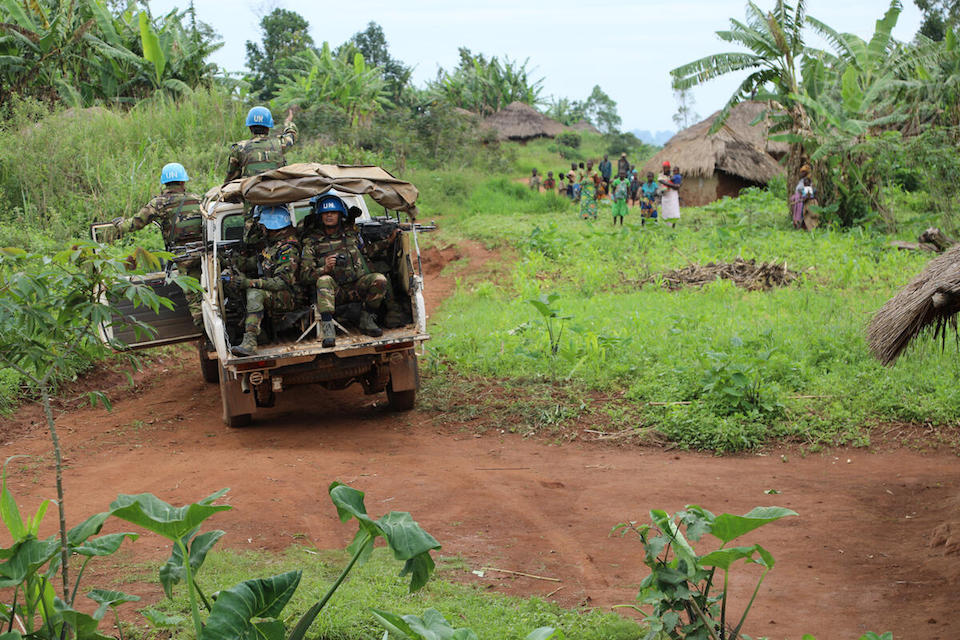Addressing the State of Siege in DRC and MONUSCO’s transition plan
Statement by Ambassador James Roscoe at the Security Council briefing on MONUSCO

Mr President, before I begin my statement, let me just join others and you in condemning the abhorrent murder of President Moïse of Haiti. We send our condolences to the people of Haiti and to his family, and our thoughts are with the injured First Lady. This Council should continue to monitor developments in Haiti closely and we must ensure accountability for those responsible for the murder.
Mr President, let me begin my response to our briefing today by thanking SRSG Keita for her comprehensive presentation and also for her reassuring leadership. I’d like also to pass to SRSG Keita our condolences on the killing of the peacekeeper Corporal Kamanga. Corporal Kamanga was simply trying to protect civilians in the DRC and do her job, and it’s appalling that she should be murdered and we condemn that.
I’m also very grateful to Dr Kibambe for her firsthand account to respond to COVID against what are very challenging circumstances.
Mr President, I will focus my intervention on three issues: the State of Siege in eastern DRC; the humanitarian situation; and MONUSCO’s transition, including SRSG Keita’s action plan.
The UK continues to be concerned by the deteriorating security situation in eastern DRC, particularly in North Kivu and Ituri. The civilian population continues to withstand appalling attacks by armed groups, and MONUSCO and DRC armed forces personnel continue to lose their lives as they attempt to tackle these armed groups. Concerted efforts are required to combat armed groups and critically to disrupt support from their political and economic backers.
We take note of the State of Siege announced by President Tshisekedi on 6 May, and his acknowledgement of and commitment to addressing the challenges the DRC armed forces need to overcome in order to tackle armed groups effectively.
The manner in which the state of siege is implemented will determine its success. In this regard, the United Kingdom urges the Government of DRC to ensure that the state of siege remains transparent, time-limited, and continues to be implemented with full respect for human rights and international law.
We also encourage the Government of DRC to increase the armed forces’ collaboration, including joint planning, with MONUSCO to ensure coordinated efforts to tackle the armed groups. On a related note, we look forward to the completion of the enhancements to MONUSCO’s Force Intervention Brigade later this month. And we also agree wholeheartedly with SRSG Keita’s assessment that military means alone cannot provide or guarantee security. The Government of DRC must focus on using security to enhance government.
Mr President, as we have noted several times before, the humanitarian situation in DRC is dire. We remain concerned about the ongoing threat posed by COVID-19 in DRC, as we’ve heard today, which remains extremely vulnerable to the health, food security, social and economic impacts of the pandemic. The United Kingdom has provided almost $17 million to support the DRC’s response to COVID-19. The rapid and effective response to the recent resurgence of Ebola in North Kivu demonstrated the importance of responding to health emergencies through local health structures and leadership.
Mr President, turning to the transition of the UN presence in DRC, the United Kingdom welcomes the establishment of the joint working group between the Government and the UN. We encourage the Government of the DRC to engage fully with MONUSCO and the UN Country Team through the joint working group, including on the articulation of a joint transition plan that is to be provided to the Council in September.
Effective coordination between MONUSCO and the UN Country Team will also be essential to the success of the transition and we encourage continued efforts to overcome the remaining coordination challenges.
In this respect, we welcome the progress that has been made in Tanganyika to bring MONUSCO, the UN Country Team, local authorities and civil society together to operationalise the provincial transition plan. In addition to the cessation of MONUSCO’s operations in the Kasais, these joint efforts in Tanganyika will enable MONUSCO to focus its efforts on the three remaining provinces heavily affected by conflict in eastern DRC. As MONUSCO’s transition progresses, it will be important to reflect on the experiences and lessons learnt in provinces the Mission has already departed from.
Finally, Mr President, we want to support SRSG Keita’s four objectives, which she clearly set out in her briefing just now. We agree that it is critical that the Mission support the Government in implementation of the Government’s action plan. We agree it is particularly critical that elections in 2023 happen on time and we urge her to continue to press for the right appointments now so that the DRC can finally deliver credible elections. We also think that political engagement to ensure non-military solutions to violence should be pursued energetically.
I thank SRSG Keita again for her leadership.
Thank you.